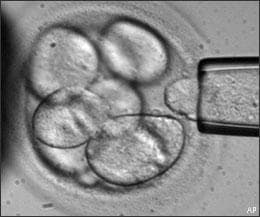Advertisement
What's Next for Stem Cells
Resume
On August 9, 2001, President George W. Bush hit the brakes on embryonic stem cell research. Not a complete halt, but a big slowdown on research into the wonder cells that can turn into any other kind of cell in the human body.
Potential cures for cancer, diabetes, heart disease, MS, Parkinson’s, and more, all seemed further away. But the work didn’t stop. Scientists in other countries jumped in, in a big way. American researchers found new ways forward.
Now Bush is gone, Obama’s in, and hopes and expectations are rising again. Stem cell research has come in from the cold, once more promising medical miracles. Last month, the FDA approved the first trials of embryonic stem cell therapy for human patients — paralyzed patients with spinal cord injuries.
All this as new methods of creating new cells from adult tissue may bypass debates over human embryos entirely.
This hour, On Point: The leading edge of stem cell research — now.
You can join the conversation. Are you hoping that stem cell therapies may one day save you or someone in your family? Are you ready to let the research roll?Guests:
David Scadden, professor of medicine at Harvard University, where he's co-director of the Harvard Stem Cell Institute, and director of Massachusetts General Hospital's Center for Regenerative Medicine.
John Gearhart, director of the Institute for Regenerative Medicine at the University of Pennsylvania. In 1998, he led one of two teams — along with James Thomson's at the University of Wisconsin — that first isolated and identified human embryonic stem cells.
This program aired on February 5, 2009.